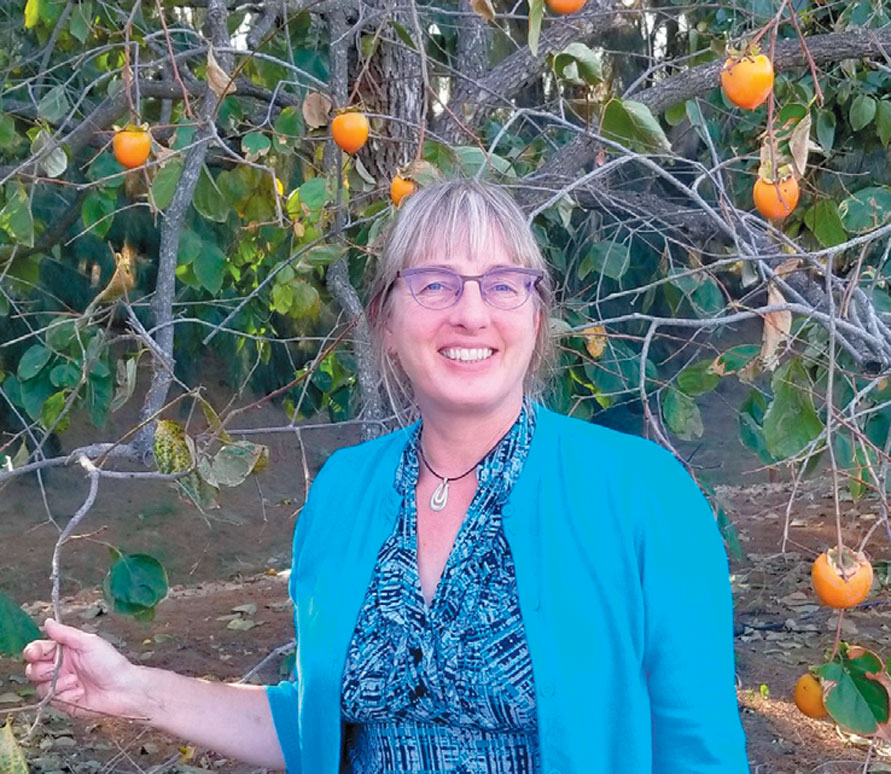Eye to the Future: Annemiek Schilder
How dairy cows ultimately led researcher Annemiek Schilder to Ventura County
Meet Annemiek Schilder, PhD, the new director of the University of California Cooperative Extension Ventura County/Hansen Agricultural Research and Extension Center (HAREC), which conducts research that supports the agricultural and natural resources of Ventura County. Her connection with our county’s food and agriculture will be influencing how we eat and what we eat. Schilder (whose first name is pronounced Ahnnuh-MEEK) is a thought leader moving the conversation about local food and agriculture forward, which is why we’re spotlighting her as someone to watch in 2019 and beyond.
Edible Ojai & Ventura County: You grew up in The Netherlands, in a family of dairy farmers. Tell us about your grandfather, and how he inspired you to embark on a career in agriculture.
Dr. Schilder: My grandfather lived to almost 100 years old. He would tell lots of stories, spiced with Westfrisian humor, while smoking a pipe or cigar. We attributed his longevity to his sense of humor and hard work on the farm. He used to say, “I can’t stand not working.” However, a fall from his bicycle at age 95 slowed him down a bit. He had a 45-acre farm in the Beemster Polder, now a Unesco World Heritage site. The heavy clay soil of the former lake, pumped dry by windmills in the year 1612, contributes to the famed flavor of Beemster cheese. My grandfather hand-milked about 20 cows, plowed with horses, and grew potatoes, sugar beets, wheat, spinach, Brussels sprouts and forage grasses.
He lost his first wife (at age 26) and later his son (17) to tuberculosis, which was common at the time. He later married my grandmother and had six more children (nine total). During World War II, various people fleeing the Nazis were in hiding for extended periods on the farm. My grandfather was quite outspoken against the German occupation, which led to him being taken hostage once by the Germans. We used to visit my grandfather regularly and the farm would always speak to my imagination.
In addition, I had many uncles on both sides of the family who had dairy, pig, field crop and flower farms. I guess I relate to the plight of farmers, the hard work and risks they endure, and the connection to the land.
Edible: You have a bachelor’s degree in agronomy, and master’s and doctorate in plant pathology. How did you choose these areas?
Schilder: My interest in plant pathology was rekindled by a class I took in my senior year; I really enjoyed looking at fungal structures through a microscope and identifying fungi by shape, color and size—they are beautiful! Plant disease diagnosis is also very fascinating to me, as it is a bit like detective work—you have to follow all the “leads” and find the “who-done-it.” What I like about this is also that a correct diagnosis helps me make recommendations that growers can use immediately to improve disease management.
Eventually I also had to work to solve plant virus infections, which are easily spread by vegetative propagation. I have always cared about nature and the environment, thus my emphasis on sustainable and organic disease management. My work in integrated pest management included collaborations with entomologists, horticulturalists and weed scientists in protecting crops from a complex of insects, weeds and diseases; a more holistic approach to plant health and crop productivity. In all cases, economic sustainability would be critical as well—if a farm is not profitable, it can’t be sustainable.
Edible: You’ve studied diseases in plants, including wheat, and spent three years in Africa researching legume and cassava diseases. Please tell us about your research—what were your goals, and how do you apply this research in your current work?
Schilder: My research during my doctoral (New York) and postdoctoral (Nigeria) studies focused on disease diagnosis, and figuring out the main pathways of disease spread of selected diseases so as to develop a management plan.
My research in Michigan encompassed disease diagnosis, improving detection of pathogens in plants and planting material, studying how diseases overwinter and develop during the season, how diseases affect yield and fruit quality and evaluating biological, physical and chemical methods of disease management. I also spent a lot of time developing extension bulletins, writing articles in extension newsletters and speaking at grower meetings in and out of state.
I hope to continue similar research and extension activities in small fruit crops and maybe other crops in Ventura County according to the needs of the industry. I will use my experience and professional network to develop collaborative projects that may have more impact than working alone.
Edible: What drew you to Ventura County?
Schilder: The position drew me here, but once I visited I found the Mediterranean climate and wide variety of crops, including subtropical fruit crops, appealing. Ventura County appears to be very dynamic and alive. I also enjoy being surrounded by the natural beauty of the ocean and mountains, which feeds the soul.
Edible: What plans do you have for UCCE Ventura County and Hansen Agricultural Research and Extension Center as its new director?
Schilder: I hope to contribute to a positive and productive working environment in the UCCE office and at HAREC, fostering collaborations among specialists and advisors and supporting the many activities of Master Gardener, 4-H and California naturalist volunteers.
One of the first things we will do is to jointly review the strategic plan (with input from stakeholders) that was developed in 2014 to adapt it to the current needs of Ventura County and develop actionable steps. Depending on the identified needs and available resources, HAREC may be modified or expanded to allow more research in berry and vegetable production as well as research on the interface of agricultural and natural environments. I also hope to strengthen our diagnostic capacity and our collaboration with local colleges to provide educational opportunities to students who aspire to agriculture-related careers. I would also like to support and increase ongoing efforts to educate students on the critical importance of food as one of our basic needs. All children should know where their food comes from, how to properly nourish their bodies and to not take the abundant availability of food for granted.
Edible: Do you like to cook or garden?
Schilder: I like to cook vegetarian food and to experiment with recipes, with irreproducible results. I find gardening relaxing and rewarding, although I mainly grow weeds.
Edible: Please share your thoughts on organic farming.
Schilder: I believe the demand for organic products will continue to increase, as people become more concerned about exposure to synthetic chemicals in food, nutrient and pesticide leaching in ground water, and the way animals are treated in conventional agriculture. One of the benefits of research on organic farming has been that it has improved our understanding of agro-ecosystem functioning from a biological perspective, which also benefits conventional growers. I think organic farming is more like working with nature instead of working against nature. Many people may not be able to afford organic food now, but as production increases and becomes more efficient, organic food may also become more affordable. I try to eat organic and locally produced food whenever possible.
Edible: Are there any specific challenges in agriculture in general or in Ventura County agriculture that you’d like to see addressed, either immediately or in the long-term?
Schilder: I am still learning about agriculture and natural resources in Ventura County, which is quite different from the Midwest. Agriculture is very dynamic here and intensive due to high land values and the mild climate, allowing for multiple crops per year and multiple rounds of pesticide and fertilizer applications, increasing pressure on the environment. The propensity of annual crops allows for rapid change in acreage, depending on price and market demand.
A big difference for me is the issue of availability and quality of irrigation water and the risk of wildfires, which can negatively affect rangeland and orchard productivity and profitability. Invasive pest species are another big issue due to the location and mild climate.








